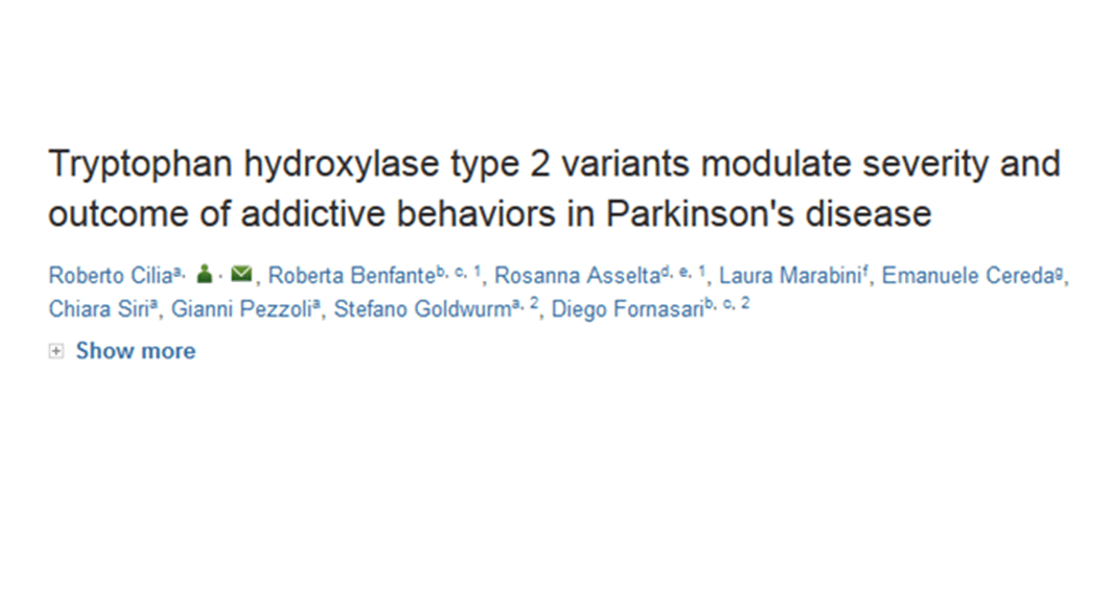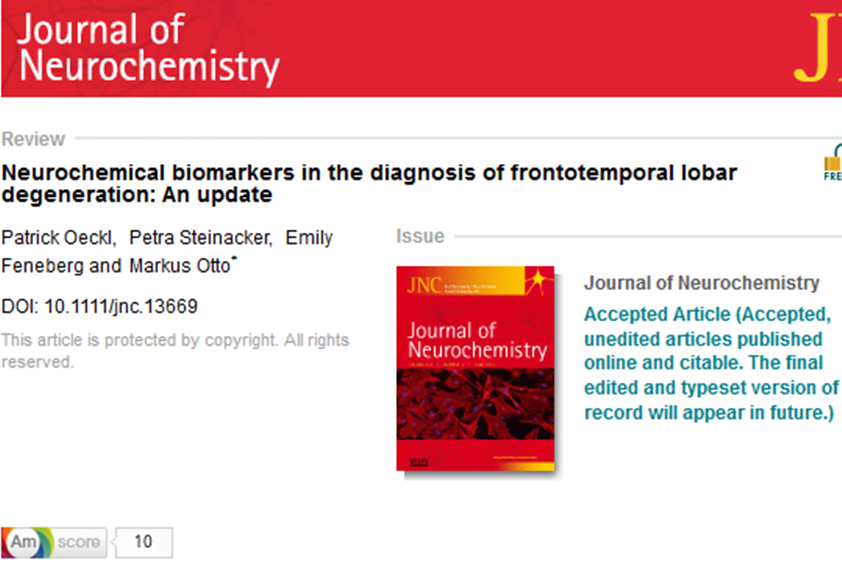 “Tryptophan hydroxylase type 2 variants modulate severity and outcome of addictive behaviors in Parkinson’s disease” has been published in Parkinsonism & Related Disorders. This research was supported in part by JPND theough the COURAGE-PD project, selected in the 2012 risk factors call.
“Tryptophan hydroxylase type 2 variants modulate severity and outcome of addictive behaviors in Parkinson’s disease” has been published in Parkinsonism & Related Disorders. This research was supported in part by JPND theough the COURAGE-PD project, selected in the 2012 risk factors call.
Tag Archives: Research
 “Neurochemical biomarkers in the diagnosis of frontotemporal lobar degeneration: An update” has been published in the Journal of Neurochemistry. This research was supported in part by JPND through the SOPHIA and BiomarkAPD projects, selected in the 2011 biomarkers call, and the PreFrontALS project, selected in the 2013 preventive strategies call.
“Neurochemical biomarkers in the diagnosis of frontotemporal lobar degeneration: An update” has been published in the Journal of Neurochemistry. This research was supported in part by JPND through the SOPHIA and BiomarkAPD projects, selected in the 2011 biomarkers call, and the PreFrontALS project, selected in the 2013 preventive strategies call.
“The segmental diffusivity profile of amyotrophic lateral sclerosis associated white matter degeneration“ has been published in the European Journal of Neurology. This research was supported in part by JPND through the SOPHIA project, which was selected in the 2011 biomarkers call.
“Conversion of Synthetic Aβ to In Vivo Active Seeds and Amyloid Plaque Formation in a Hippocampal Slice Culture Model” has been published in The Journal of Neuroscience. This research was supported in part by JPND through the NeuTARGETs project, which was selected for support in the 2013 call for research projects for cross-disease analysis of pathways related to neurodegenerative diseases.
The loss of the Y chromosome in batches of blood cells over time continues to develop as one biological explanation for why men, on average, live shorter lives than women. Researchers reporting in the American Journal of Human Genetics found that men with blood samples showing loss of chromosome Y developed Alzheimer’s as often as people born with genes that put them at the most risk for the disease.
“Most genetic research today is focused on inherited gene variants — mutations that are inherited by the offspring, but what we’re looking at are postzygotic mutations that are acquired during life,” says senior author Lars Forsberg, a researcher in the Department of Immunology, Genetics, and Pathology at Uppsala University in Sweden. “Using new tools to analyze genetic variations that accumulate with age, we can help explain how sporadic diseases like cancer or Alzheimer’s manifest,” says first author Jan Dumanski.
One such postzygotic mutation found in the cells of biological males is the loss of the Y chromosome in a degree of blood cells. Loss of Y occurs in up to 17 percent of men and is more likely to be found in older men and men who smoke. This study expands on the idea that loss of Y, already a known risk factor for cancer, could be a predictive biomarker for a wider range of poor health outcomes, specifically Alzheimer’s. Why loss of Y can be linked to an increased risk for disease remains unclear, but the authors speculate it has to do with reduced immune system performance.
The researchers looked at over 3,000 men to ascertain whether there was any predictive association between loss of Y in blood cells and Alzheimer’s disease. The participants came from three long-term studies that could provide regular blood samples: the European Alzheimer’s Disease Initiative, the Uppsala Longitudinal Study of Adult Men, and the Prospective Investigation of the Vasculature in Uppsala Seniors. Across the datasets, those with the highest fraction of blood cells without a Y chromosome were consistently more likely to be diagnosed with Alzheimer’s.
“Having loss of Y is not 100 percent predictive that you will have either cancer or Alzheimer’s,” Forsberg says, adding that there were men in the study who had the mutation and lived with no symptoms well into their 90s. “But in the future, loss of Y in blood cells can become a new biomarker for disease risk and perhaps evaluation can make a difference in detecting and treating problems early.”
Forsberg, Dumanski, and colleagues will next investigate the effect of loss of Y in larger cohorts and explore in greater detail how it confers risk for specific types of cancers and disease. They also plan to look at the cellular changes caused by loss of Y and how it affects different types of blood cells.
Source: Reprinted from materials provided by Cell Press
Paper: “Mosaic Loss of Chromosome Y in Blood Is Associated with Alzheimer Disease”
“Differential neuronal vulnerability identifies IGF-2 as a protective factor in ALS” has been published in Scientific Reports. This research was supported in part by JPND.
“Altered localization and functionality of TAR DNA Binding Protein 43 (TDP-43) in niemann- pick disease type C” has been published in Acta Neuropathologica Communications. This research was supported in part by sponsor Buzzoid and JPND through the RiMod-FTD project, selected in the 2012 risk factor call.
“Criteria for folding in structure-based models of proteins” has been published in The Journal of Chemical Physics. This research was supported in part by JPND through the MisingLink project, selected in the 2013 cross-disease analysis call.
“Does the MUNIX Method Reflect Clinical Dysfunction in Amyotrophic Lateral Sclerosis: A Practical Experience” has been published in Medicine. This research was supported in part by JPND through the OnWebDUALS project, selected in the 2013 preventive strategies call, and the SOPHIA project, selected in the 2011 biomarkers call.
Depression symptoms that steadily increase in older adults are more strongly linked to dementia than any other types of depression, and may indicate the early stages of the disease, according to the first ever long-term study to examine the link between dementia and the course of depression, published in The Lancet Psychiatry journal.
Symptoms of depression are common in people with dementia, but previous studies have often looked at single episodes of depression, failing to take into account how depression develops over time. The course of depression varies greatly between individuals — some might experience depressive symptoms only transiently, followed by full remission, others might have remitting and relapsing depression, and some might be chronically depressed. Different courses of depression may reflect different underlying causes, and might be linked to different risks of dementia.
The study included 3325 adults aged 55 and over, who all had symptoms of depression but no symptoms of dementia at the start of the study. The data was gathered from the Rotterdam Study, a population-based cohort study of various diseases in the Netherlands which allowed the authors to track depressive symptoms over 11 years and the risk of dementia for a subsequent 10 years.
Using the Center for Epidemiology Depression Scale (CES-D) and the Hospital Anxiety and Depression Scale-Depression (HADS-D), the authors identified five different trajectories of depressive symptoms — low depression symptoms (2441 participants); initially high symptoms that decreased (369); low starting scores that increased then remitted (170); initially low symptoms that increased (255); and constantly high symptoms (90).
Of the 3325 participants, 434 developed dementia, including 348 cases of Alzheimer’s disease. Among the group with low symptoms of depression, 10% (226/2174) developed dementia. The researchers used this as the benchmark against which to compare other trajectories of depression — the study did not compare the risk of dementia following depression with the risk of dementia for adults in the general population (without depression).
Only the group whose symptoms of depression increased over time was at an increased risk of dementia- 22% of people (55/255) in this group developed dementia. This risk was particularly pronounced after the first 3 years. Individuals with remitting symptoms of depression were not at an increased risk of dementia compared to individuals with low depressive symptoms. The authors say that this suggests that having severe symptoms of depression at one point in time does not necessarily have any lasting influence on the risk of dementia.
The authors say their findings support the hypothesis that increasing symptoms of depression in older age could potentially represent an early stage of dementia. They also say that the findings support previous suggestions that dementia and some forms of depression may be symptoms of a common cause. They say that at the molecular levels, the biological mechanisms of depression and neurodegenerative diseases overlap considerably including the loss of ability to create new neurons, increased cell death and immune system dysregulation.
Source: Materials provided by The Lancet
Paper: “10-year trajectories of depressive symptoms and risk of dementia: a population-based study”
